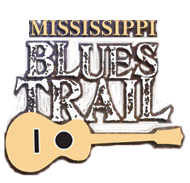Greasy Street
Greasy Street - Ruleville
For many decades this block of Front Street, known locally as “Greasy Street,” was the center of commercial activity for African Americans in the Ruleville area. On Saturday nights Greasy Street was packed with people dressed in their finest clothes who visited establishments including Mack’s Colored Cafe. Blues musicians who played in Ruleville included Charley Patton, David “Honeyboy” Edwards, and Howlin’ Wolf.
Front Street was the first commercially developed area in Ruleville, its name stemming from its location fronting the railway line. It is not clear how the block known as “Greasy Street” got its nickname, but a popular explanation is that café owners would throw old grease on the street to keep down the dust. J. W. Rule of the founding Rule family laid Ruleville’s city plan in 1898, the year after the Yazoo Delta Railway (called the “Yellow Dog,” after its initials) extended its line northward from Moorhead, where it intersected with the Southern Railway—a location famous in blues lore as “where the Southern cross the Dog.” With the arrival of the train the local population grew dramatically, both in town (from 226 in 1900 to 1022 in 1920) and on plantations in the area.
Located a block south of the railroad depot and across the tracks from several cotton gins, Greasy Street became a destination for blues performers, especially on Saturday afternoons, when the street was crowded with residents of nearby plantations who came to town to shop and relax. Shaw native David “Honeyboy” Edwards recalled seeing Charley Patton play here in the 1930s. Patton, the Delta’s most influential bluesman, lived on the Dockery plantation four miles to the west. Edwards played on Greasy Street together with Howlin’ Wolf (Chester Arthur Burnett), who lived on the Young & Morrow plantation between Ruleville and Doddsville. The main musical establishment on Greasy Street for many years was Mack’s Colored Cafe, operated by McKinley Harvey, and during the segregation era the Annex Theatre catered to African Americans. The block also housed two grocery stores run by people of Chinese descent. In 1918 Jim Kee opened his store, which was later run by Kan and May Jee as Kan’s Food Market; James Jee operated the adjacent Jee & Company store. Saturday night juking remained a vibrant tradition in Ruleville longer than in many other Delta towns, thanks to Greasy Street nightspots such as Club 21, Top Ten Club, Main Event, Jap’s Disco, and especially Club Black Castle, which also housed Mr. Fugee’s Bar and Grill.
Other musicians who were born or lived in the Ruleville area include Chicago bluesman Jimmy Rogers (1924-1997); Charley Patton associate Ben Maree (born c. 1870), one of many artists that folklorist David Evans identified as playing in a local blues style he called the “Drew tradition”; Chicago bassist Hayes Ware (1927-1987); singer-guitarist Jeanne Carroll (1931-2011), who was based in Chicago prior to spending her final years in Germany; guitarist Jerry “Duff” Dorrough (1952-2012), who was adept at blues, soul, gospel, and country; and Olin “Grandad” Hughes, a friend of Honeyboy Edwards. Hughes learned from another guitarist in Ruleville, Clyde Richardson, who was known locally as “T-Bone Walker.” Artists from nearby Doddsville include acoustic performer and blues educator Fruteland Jackson (b. 1953) and Chicago vocalist Peaches Staten (b. 1961).
content © Mississippi Blues Commission
[ BACK TO TOP ]

